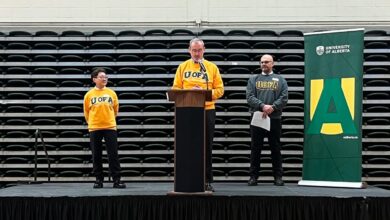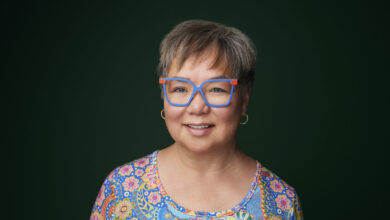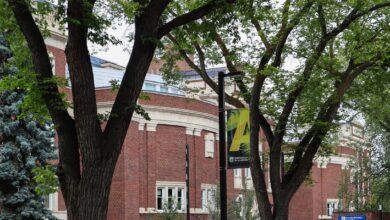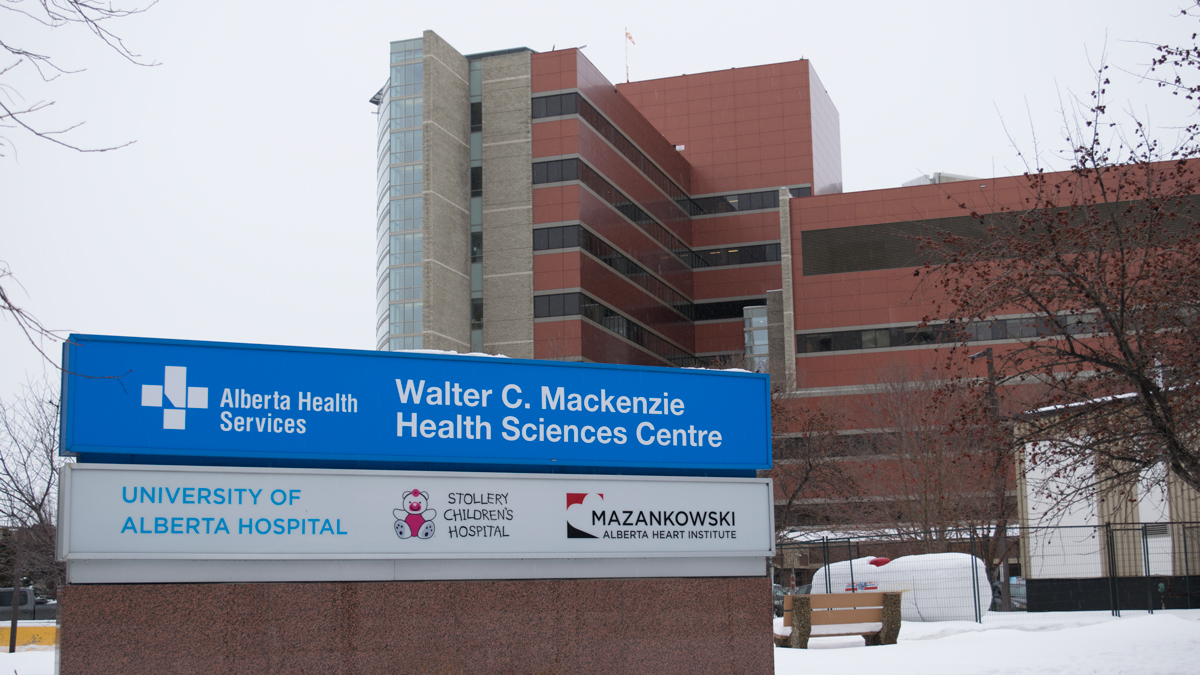Protestors at U of A rally call for Flanagan’s resignation
Speakers at the rally spoke about the removed Palestine solidarity encampment, the U of A community's demands for administration, and called for President and Vice-chancellor Bill Flanagan's resignation.
 Lily Polenchuk
Lily PolenchukAt noon on May 14, a rally of over 300 people gathered in support of the Peoples’ University for Palestine YEG outside of the South Academic Building (SAB) at the University of Alberta.
The rally, organized by Faculty for Palestine Alberta — which consists of faculty members across Alberta — was a response to the removal of a student-led Palestine solidarity encampment, organized by Peoples’ University for Palestine. The encampment began on May 9 and was taken down by Edmonton Police Services (EPS) on May 11, at the university’s request.
Protestors held signs saying “Flanagan should resign” and “shame on Flanagan,” while chanting for “Bill to quit” and amnesty for participants of the encampment.
Faculty for Palestine Alberta organized an open letter titled “faculty against the brutalization of students at the hands of administrators at the U of A,” created on May 11. As of May 14 at 4:25 p.m., the letter had 253 faculty signatories and 679 alumni, community member, parent, staff, and student signatories.
The letter echoes students’ demands for university disclosure of and divestment from “institutional and financial investments that contribute to the illegal occupations and ongoing genocide against Palestinians,” and the resignation of Flanagan. The letter also calls for amnesty for all protestors and a retraction of the campus ban vocally issued by Frank Page, the U of A Protective Services (UAPS) Threat Assessment Program and Investigations Manager.
Sara Carpenter, an associate professor in the faculty of education, spoke at the rally about the demands of the letter.
“We echo the students’ demands that Flanagan resign. He has crossed the line and his actions cannot be excused, defended, justified, or forgotten. He has resorted to gross misrepresentation of the events of Saturday,” Carpenter said. “Flanagan should resign and take his toxic administration with him.”
Carpenter said Faculty for Palestine Alberta recognizes that other university leadership was involved with the decisions made during and before the encampment. She called on Vice-provost and Dean of Students, Ravina Sanghera, and Associate Vice-president (student experience) ,Tim Tang, for their “egregious failure to protect students.”
Carpenter also called on the director of Campus Protective Services, Mike Bartkus, Vice-president (university services and finance) Todd Gilchrist, and Page for “facilitating EPS’ assault on this campus, for misrepresenting policies, and terrorizing students.”
“If you’re truly an educator, you will do what’s right to protect your students” encampment organizer and student says
David Kahane, a U of A professor in the department of political science, gave a speech at the rally. Kahane was present at the encampment and said there was “no threat, it was perfectly safe.”
“The use of dangerous police force was completely illegitimate and obscene,” Kahane said. “If they understood what a real university is, they would understand that the encampment represents the beating heart of this university.”
Kahane demanded the university give students and faculty involved in the encampment amnesty, return personal items taken from the encampment, and send out university administration to meet with the students about their demands.
Michael Litwack, an associate professor in the department of English and film studies, was present at the encampment when EPS dispersed it. He called the events of May 11 “horrifying.”
“The recent violence that [Flanagan] unleashed on our community is just one particularly brutal chapter in a persistent and systematic campaign by the U of A to repress opposition to colonialism, occupation, and racial genocide in historic Palestine.”
After, Muna Saleh, an associate professor in the faculty of education at Concordia University and three-time U of A graduate, spoke. Saleh said that colonial institutions like the U of A give land acknowledgements and “wax poetic” about academic freedom, even as they “authorize the police to brutally suppress and enact violence on students, faculty, staff, alumni, and community members.”
“Universities on these colonized lands have not only remained silent about the genocide of Palestinians in Gaza,” Saleh said. “They continue to actively contribute and profit through their partnerships and investments.”
Lastly, Noor, an encampment organizer and U of A student, spoke about the experiences of Palestinian students on campus.
“I remove my keffiyeh when I go into a lot of spaces because of how my cultural identity and my resistance to the genocide of my people might make others uncomfortable, vulnerable to discrimination, and academic sanctions.”
Faculty and staff have a duty to demand for the resignation of Flanagan, Noor said.
“If you’re truly an educator, you will do what’s right to protect your students from literal violence and hospitalization.”
Associate dean resigns in response to encampment removal
On May 13, Natalie Loveless tenured her resignation from her position as faculty of arts associate dean (equity, diversity, and inclusion). Loveless is also a professor in the department of art and design. She is the first from U of A administration to publicly resign in response to the encampment removal.
“With police marching on our students, on our campus, I can neither protect students nor facilitate the difficult conversations that are needed to advance equity and justice for our community,” a statement from Loveless read. “I therefore resign from my position.”
At the rally, Loveless was invited to speak following Saleh. On May 11, when the protesters were pushed by EPS to Saskatchewan Drive North West, Loveless said she had been “called to bear witness.”
“The violence and the sounds of those guns — I hear they were pepper-guns, but it sounded like automatic rifles. I still hear them when I sleep. If I’m carrying that with my privilege … I have no idea what those folks who were there through the whole thing are feeling right now,” Loveless said.
“For those students, faculty, and community members that supported them, I say I am sorry and I thank you.”
-With files from Leah Hennig




